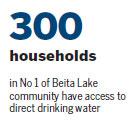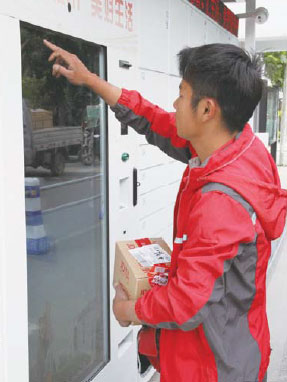New tech provides clever solutions for new communities
From gates that recognize the faces of the residents in a community and bus stops that tell people when the next bus will arrive, to garbage cans that notify refuse collectors when they are full - smart devices are fast becoming a part of everyday life in Yinchuan.
Thanks to the partnership between the local government and domestic IT giant ZTE, smart technologies are being increasingly used in Yinchuan's residential communities.
The currently under construction Xiyuntai is one of the latest pilot smart communities in the city. The temperature, humidity and oxygen content in each room in every building are adjusted automatically by a smart air conditioning system.
"The smart city is a massive project that needs investment, cooperation among agencies, systematic operation and data sharing," said He Jianmin, an executive of ZTE responsible for smart community projects. He added that smart communities include a range of services and provision such as security solutions and new models of healthcare service.
The gated entrance to Xiyuntai is equipped with a facial recognition system that is connected to the database of the local public security agency. It recognizes the faces of the community's residents, updates its facial image database, and sends alerts to the police when it finds wanted suspects.

The system boasts a high recognition rate in both strong and weak sunlight, according to He.
Facial recognition is also used in healthcare services. Hospitals equipped with the system immediately recognize patients at the reception desk, and their medical records are automatically sent to doctors' computers.
Smart communities are also equipped with health stations, where residents can get a checkup. Their data is subsequently saved in a cloud system, where it can be easily accessed and monitored by healthcare professionals.
Xu Tao, a ZTE executive responsible for smart healthcare, said the smart healthcare system links health checkup stations, community clinics and major hospitals, allowing residents to take advantage of high-quality, local medical services.
Some communities have also fitted direct-drinking water systems, in which clean, fresh groundwater is pumped up, filtered and sent to every room that is signed up to receive the service.
The system features an integral water quality monitoring capability, which sends a message to the supplier the filter is coming to the end of its life.
In one community, called No 1 of Beita Lake, the direct drinking water system is now being accessed by more than 300 households.
In the three completed pilot smart residential communities, there are about 50 free WiFi spots, along with noise supervision systems and nearly 20 smart garbage cans.
There are also six self-service delivery storage systems that can be used to not only store packages, but also to pay water, gas and telephone bills.
The Yinchuan government has drafted plans to expand such smart devices to 100 residential communities across the city by 2017.
|
A delivery worker uses the smart storage system in a residential community in Yinchuan. |
(China Daily 09/07/2016 page10)















